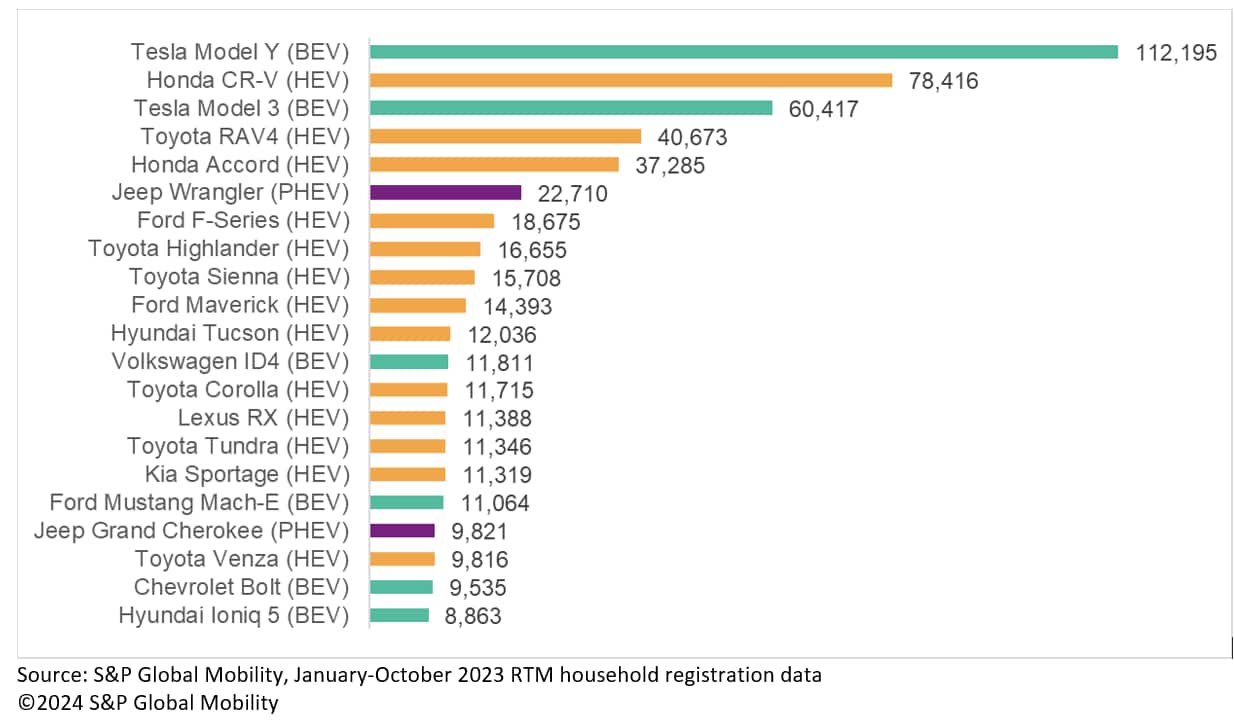Discover more about S&P Global's offerings
Customer Logins
Obtain the data you need to make the most informed decisions by accessing our extensive portfolio of information, analytics, and expertise. Sign in to the product or service center of your choice.
Customer Logins
BLOG
Jan 10, 2024
Gasoline households migrating to hybrid cars more than to EVs
US consumers may not be crossing the chasm to EV ownership just yet, according to new analysis from S&P Global Mobility.
According to return-to-market vehicle registration data, households
with gasoline internal-combustion engine vehicles are more likely
to migrate to hybrid cars (including both HEVs and PHEVs) than to
full battery electric vehicles (BEV). And if Tesla is removed from
the equation, other brands' EVs are barely represented in the
migration-from-ICE list.
For the period from January through October 2023, 8.3% of gasoline
households who returned to the market for a new vehicle acquired a
hybrid model. Perhaps more significant, this is a rising trend,
reaching 9.9% in October - marking the highest rate of the year and
a 3.8 percentage point increase compared to October 2022. By
comparison, 5.7% of ICE households acquired a battery electric
vehicle in October 2023 - albeit also on a rising trend line.
"The automotive industry's transformation to fully electric may not
be as rapid as EV advocates are hoping, as US consumers
increasingly opt for more sustainable and energy-efficient
vehicles," said Tom Libby, associate director for loyalty solutions
and industry analysis for S&P Global Mobility. "This consumer
trend of taking a half-step by choosing a hybrid instead of moving
directly to an EV may be a sign of tentativeness to fully embrace
electricity as the means of propulsion."
% of Gas RTMs Migrating to Hybrid (HEV/PHEV) & Electric
Fuel Types

This could be due to several factors. Hybrids offer a compromise
between the familiarity of gasoline-powered cars and the
environmental benefits of EVs. They also eliminate the range
anxiety and charging concerns associated with EVs, as they can
switch to gasoline power when the battery runs low.
Even more so, pricing parity between gasoline and hybrid models
plays a significant role in this trend. Year to date, gasoline
households who acquired another gas model have an average monthly
payment of $675 on their new vehicle, according to
AutoCreditInsight by S&P Global Mobility and Transunion. Those
who bought a full hybrid pay $670, slightly less than their
gasoline counterparts. However, households who opted for PHEVs have
a higher average monthly payment of $798, and those who chose an EV
pay the highest at $828. The data suggest that cost considerations
could be a significant factor driving the preference for hybrids
over other EVs.
Average Acquired Monthly Payment by Fuel Type - Gas RTMs

When it comes to specific hybrid models, the Honda CR-V Hybrid is
most popular among prior gasoline households year-to-date. The next
most popular models are the Toyota RAV4 Hybrid and Honda Accord
Hybrid. The Jeep Wrangler stands out as the most popular <span/>PHEV model.
However, when looking at household migration to EVs from gasoline, if the Tesla Model Y and Model 3 are removed from the data set, hardly any other brand's EV makes significant inroads among those migrating from ICE to a greener solution.
Top Acquired Electrified Models among ICE household
RTMs

This trend toward hybrids is likely to have significant
implications for automakers -
especially as more<span/>BEVs arrive on showroom floors. It
suggests that there may be a substantial market for vehicles that
offer a balance between traditional gasoline power and the benefits
of electrification. <span/>OEMs like Toyota and Honda, who have
refrained from fully committing to EVs while still delivering
efficient, reliable hybrid vehicles, are likely to see increased
demand. Toyota recently launched a redesigned Prius in hybrid and
plug-in options and announced that the next-generation Camry will
only be offered as a hybrid.
While the shift toward EVs seems inevitable, the path to full electrification may not be straightforward. The rising trend of gas households migrating to hybrid models suggests that the automotive industry needs to cater to a range of consumer preferences and concerns.
FOR MORE ELECTRIC VEHICLE TRENDS
DEMO OUR VEHICLE TECHNICAL INTELLIGENCE PLATFORM
AUTOMOTIVE PLANNING AND FORECASTING
LIGHT VEHICLE POWERTRAIN FORECASTS
DOWNLOAD OUR TOP 10 INDUSTRY TRENDS NEWSLETTER
This article was published by S&P Global Mobility and not by S&P Global Ratings, which is a separately managed division of S&P Global.
{"items" : [
{"name":"share","enabled":true,"desc":"<strong>Share</strong>","mobdesc":"Share","options":[ {"name":"facebook","url":"https://www.facebook.com/sharer.php?u=http%3a%2f%2fstage.www.spglobal.com%2fmobility%2fen%2fresearch-analysis%2fgasoline-consumers-migrating-to-hybrid-cars-not-evs.html","enabled":true},{"name":"twitter","url":"https://twitter.com/intent/tweet?url=http%3a%2f%2fstage.www.spglobal.com%2fmobility%2fen%2fresearch-analysis%2fgasoline-consumers-migrating-to-hybrid-cars-not-evs.html&text=Gasoline+households+migrating+to+hybrid+cars+more+than+to+EVs+%7c+S%26P+Global+","enabled":true},{"name":"linkedin","url":"https://www.linkedin.com/sharing/share-offsite/?url=http%3a%2f%2fstage.www.spglobal.com%2fmobility%2fen%2fresearch-analysis%2fgasoline-consumers-migrating-to-hybrid-cars-not-evs.html","enabled":true},{"name":"email","url":"?subject=Gasoline households migrating to hybrid cars more than to EVs | S&P Global &body=http%3a%2f%2fstage.www.spglobal.com%2fmobility%2fen%2fresearch-analysis%2fgasoline-consumers-migrating-to-hybrid-cars-not-evs.html","enabled":true},{"name":"whatsapp","url":"https://api.whatsapp.com/send?text=Gasoline+households+migrating+to+hybrid+cars+more+than+to+EVs+%7c+S%26P+Global+ http%3a%2f%2fstage.www.spglobal.com%2fmobility%2fen%2fresearch-analysis%2fgasoline-consumers-migrating-to-hybrid-cars-not-evs.html","enabled":true}]}, {"name":"rtt","enabled":true,"mobdesc":"Top"}
]}


